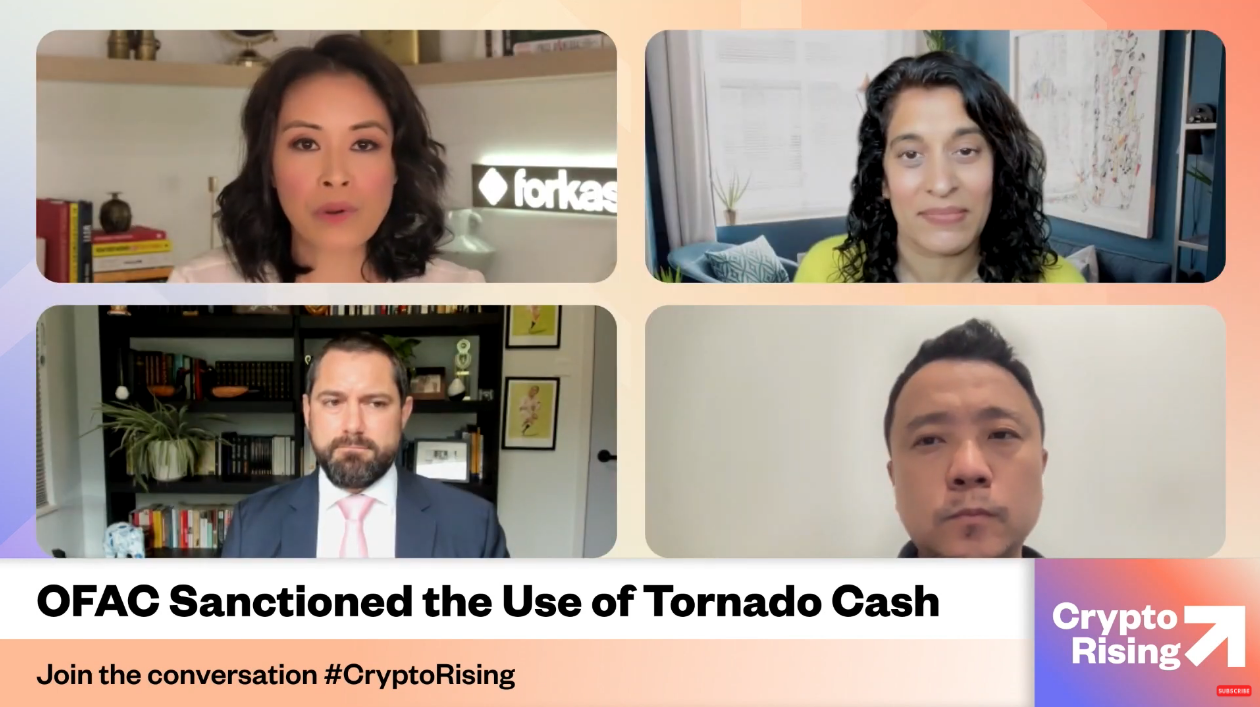The U.S. Treasury Department sanctioning cryptocurrency mixer Tornado Cash for allegedly facilitating money laundering in August sparked global debate about balancing demands for financial privacy with the need to police international cybercrime.
Nearly two months later, that debate is alive and well as the industry, regulators and individuals will need to ask themselves what value they place on privacy, according to panelists speaking at Forkast’s recently live-streamed event “Crypto Rising: The Role of Law: An International Debate post Tornado Cash.”
“[I] realized pretty quickly that this was something we had never seen before,” Sheila Warren, CEO of the Crypto Council for Innovation, said of the sanctions. “And it was going to have potentially very far-reaching implications.”
An unusual step
A cryptocurrency mixer is a service that allows users to deposit cryptocurrency and withdraw the same amount in different tokens, minus a fee. This helps give anonymity to transactions in a payment system where normally every move is recorded on the blockchain in perpetuity.
The U.S. Treasury Department’s Office of Foreign Assets Control (OFAC) alleges the service was used by the North Korean cybercriminal organization Lazarus Group to launder US$7 billion in ill-gotten funds.
Warren told the panel that while the U.S. government had sanctioned particular crypto wallet addresses in the past, this new step targeting the code in the blockchain was unusual.
“This is a departure from the principle that code or technology itself has a fundamental neutrality that is benign, and it is what you do with it that is what turns it into something that can be malicious,” she said, adding that sanctioning code sets a precarious precedent for a country that prides itself on freedom of speech.
Crypto and the law
Jonathan Crompton, partner at RPC in Hong Kong, told the panel that the sanctioning should not have come as a surprise. In October 2020, the U.S.-based Financial Crimes Enforcement Network and OFAC both released guidance on potential sanctions risks involved in facilitating ransomware payments, for example.
He explained that as regulators try to protect investors from bad actors, especially state-backed ones in the case of the Lazarus Group, they will begin examining more elements of the crypto industry more closely.
“As the cryptocurrency industry integrates more and more, it is going to have to play by the rules that everybody else is already playing [by],” he said.
Most of the crypto industry is already complying with sanctions and many other regulations necessary for interacting with the traditional finance sector, said Wei Zhou, CEO of Philippines-based crypto and mobile wallet Coins.PH.
From his perspective, the industry needs more than simply enforcement action.
“We need two things from a regulator: we need clarity, but first we need certainty,” he said. “Right now both are completely missing [from most jurisdictions].”
When the clarity is missing, it’s not just crypto businesses but everyday people who get caught in the crossfire, Warren argued, as now countless Tornado Cash users have funds frozen in the service and must apply to have those funds returned.
“The overreach in some of these cases means that people that are engaging in completely innocent, harmless, by any estimation, conduct are also getting caught up in ways that are very damaging not only to the innovation curve but also to those individuals themselves,” she said.

